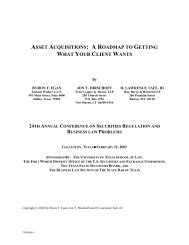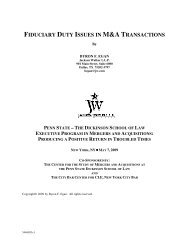Legal Implications of User Generated Content: YouTube, MySpace ...
Legal Implications of User Generated Content: YouTube, MySpace ...
Legal Implications of User Generated Content: YouTube, MySpace ...
You also want an ePaper? Increase the reach of your titles
YUMPU automatically turns print PDFs into web optimized ePapers that Google loves.
violations <strong>of</strong> the California Business and Pr<strong>of</strong>essions code. Discovery is alsoongoing in that suit.E. The Digital Millennium Copyright ActThe Digital Millennium Copyright Act (“DMCA”) was enacted in 1998 to “protectthe intellectual property rights <strong>of</strong> creative works available online in ways thatpromote the use <strong>of</strong> the Internet, both by content providers and users.” 14 Title II <strong>of</strong>the DMCA, the Online Copyright Infringement Liability Limitation Act, created anew section, 17 U.S.C. § 512, entitled “Limitation on Liability Relating to MaterialOnline.” This was a compromise between content owners (e.g., Sony, MGM, andUniversal) and website operators who <strong>of</strong>ten were the unlicensed distributors <strong>of</strong> thatcontent. This compromise gave content owners a mechanism to protect theircopyrighted material through detailed “take down” provisions. “At the same time, itprovides greater certainty to service providers concerning their legal exposure forinfringements that may occur in the course <strong>of</strong> their activities.” 15The DMCA Safe HarborsSection 512 creates four new limitations on liability for copyright infringement by anInternet/online service provider based on the following four categories <strong>of</strong> conductby the ISP:1. Transitory digital network communications – § 512(a), which applies totransmission and routing activities.2. System Caching – § 512(b), which applies to temporary intermediate storageduring transmission.3. Information residing on systems at the direction <strong>of</strong> users – § 512(c), whichapplies to user-directed storage <strong>of</strong> material on a system. This is the safeharbor sought by UGC providers.4. Information location tools – § 512(d), which applies to directories, indexes,references, pointers, and hypertext links including search engines.“These safe harbors limit liability but ‘do not affect the question <strong>of</strong> ultimate liabilityunder the various doctrines <strong>of</strong> direct, vicarious, and contributory liability,’ . . . and14 H. Rep. No. 105-551 Pt. II, at 49.15 Id.; S. Rep. No. 105-190, at 65; 144 CONG. REC. 7, 9236 (1998) (“The bill provides ‘safe harbors’ from liability underclearly defined circumstances, which both encourage responsible behavior and protect important intellectual propertyrights.”). The DMCA provides “immunity to service providers from copyright infringement liability for ‘passive,’‘automatic’ actions in which a service provider’s system engages through a technological process initiated by anotherwithout the knowledge <strong>of</strong> the service provider.” Perfect 10, Inc. v. CCBill, LLC, 340 F. Supp. 2d 1077, 1086 (C.D. Cal.2004) (“Perfect 10 I”); Cyrus Sarosh Jan Manekshaw, Liability <strong>of</strong> ISPS: Immunity from Liability Under the Digital MillenniumCopyright Act and the Communications Decency Act, 10 COMPUTER L. REV. & TECH. J. 101, 114 (2005).4
















